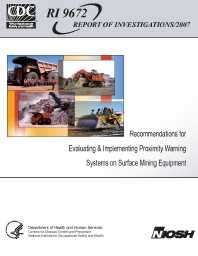Mining Publication: Recommendations for Evaluating & Implementing Proximity Warning Systems on Surface Mining Equipment
Original creation date: June 2007
Researchers at the National Institute for Occupational Safety and Health, Spokane Research Laboratory, studied technology and methods that could reduce accidents involving surface mining equipment that collides with other vehicles or workers, or drives over an unseen road edge. These accidents are partially attributed to the lack of full visibility around these large pieces of equipment. Blind areas can be extensive and this report presents plots of blind areas for five pieces of surface mining equipment. Several technologies designed for detecting obstacles in blind areas and providing a warning to the operator were evaluated on off-highway dump trucks. These proximity warning systems included radar, sonar, GPS, radio transceiver tags, and combinations of radar and cameras. A summary of test results is presented in this report, along with guidance on effective proximity warning technology, installation and maintenance considerations, and recommendations for effective implementation. This study found several commercially available systems that could effectively warn an equipment operator of an impending collision. Several new technologies also show promise for reducing these accidents. In most applications, it is recommended that sensor-based systems be combined with video cameras to provide important alarming functions along with an actual view of the blind area.
Authors: TM Ruff
Report of Investigations - June 2007
NIOSHTIC2 Number: 20032431
Spokane, WA: U.S. Department of Health and Human Services, Public Health Service, Centers for Disease Control and Prevention, National Institute for Occupational Safety and Health, DHHS (NIOSH) Publication No. 2007-146, Report of Investigations 9672, 2007 Jun; :1-80
See Also
- An Active Proximity Warning System for Surface and Underground Mining Applications
- Advances in Proximity Detection Technologies for Surface Mining Equipment
- Engineering Considerations and Selection Criteria for Proximity Warning Systems for Mining Operations
- Innovative Safety Interventions: Feasibility of Using Intelligent Video for Machinery Applications
- Preventing Collisions Involving Surface Mining Equipment: A GPS-based Approach
- Proximity Detection
- Proximity Detection: A Continuing Research Imperative
- Proximity Warning Systems for Mining Equipment
- Recommendations for Testing Radar-Based Collision Warning Systems on Heavy Equipment
- Test Results of Collision Warning Systems for Surface Mining Dump Trucks
- Test Results of Collision Warning Systems on Off-Highway Dump Trucks: Phase 2
- Content source: National Institute for Occupational Safety and Health, Mining Program


 ShareCompartir
ShareCompartir
